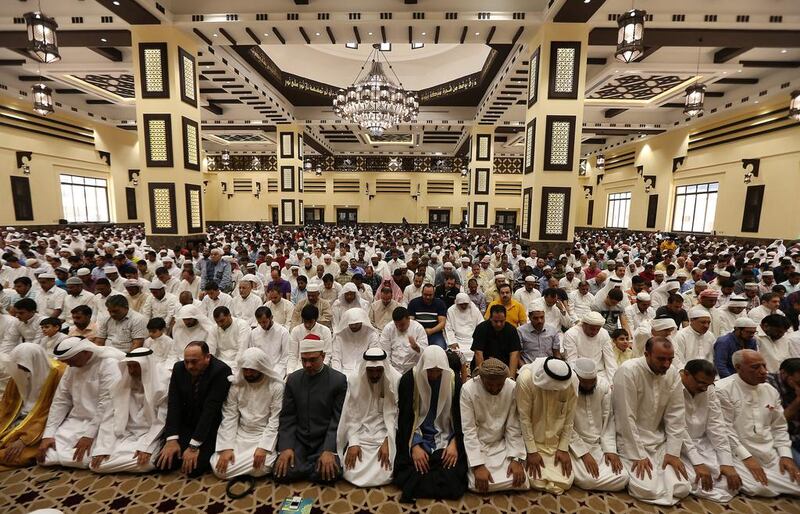DUBAI // The Muslim faithful filled the grand and expansive Khalifa Al Tajer Mosque to its capacity at its official opening for Friday prayers .
Located in Deira, the first environmentally friendly mosque in the Islamic world is Dubai’s largest, and Sheikh Salih Al Maghamsi, the imam of the famous Quba Mosque in Medina, Saudi Arabia, inaugurated the mosque by delivering the Friday sermon.
The Dh22 million building is able to accommodate 3,500 worshippers, and many of them on Friday were unaware of its significance.
“This is a very nice mosque. I didn’t realise it was environmentally friendly, as it doesn’t look like they are skimping on anything,” said Khalid Ali Al Haj, a 35-year-old supervisor at Deira City Centre bus terminal. He came to the mosque because he was rushing to find one near his workplace to pray.
“All the mosques should be green. God hates wasteful people, so these green solutions are very appropriate, and this is the best place for people to learn about environmental conservation.
“I think I will have all my prayers at this mosque when I’m at work, it is only a few steps from the terminal.”
Ahmad Al Sharif, a 34-year-old Egyptian legal consultant, said the new mosque was very nice, comfortable and beautiful. “I didn’t find anything different or lacking about it from any other mosque,” he said. “I came here today because this is now the closest mosque to my home. I used to go to the mosque across the street, but it gets too crowded at Friday prayers.”
The Khalifa Al Tajer Mosque has sensors for the air-conditioning and lighting, and solar-powered water heaters and exterior lights. The ablution stations are also designed to save water.
“This mosque has been designed to save 20 to 25 per cent on energy and water resources,” said Tayeb Abdul Rahman Al Rais, the secretary general of Awqaf and Minors’ Affairs Foundation, a Dubai government body.
“We have built this mosque in support of the goal and strategies of Dubai emirate to promote sustainable designs and support environmental solutions to preserve this land for many generations to come. We have materials that resist wear and tear and will last a long time.”
The 4,180-square-metre mosque has three halls: the grand prayer hall, the daily prayer hall and the women’s prayer hall. The women’s prayer hall, which is the same size as the daily prayer hall, is on the second floor. It has its own ablution stations on the first floor.
“The grand prayer hall will remain closed on regular days, and will only be used for Friday prayers and special occasions to conserve energy. All other prayers will be conducted in the daily prayer hall,” said Mr Al Rais.
“This mosque is the first of its kind in the Islamic world, but not for long, as requests have already come in from Ahmed bin Sulayem to have an identical mosque built in DMCC community [Jumeirah Lakes Towers].”
The Khalifa Al Tajer Mosque complies with the silver standard of the United States Green Building Council’s Leadership in Energy and Environmental Design (Leed) certification.
“The new mosque was built to meet guidelines set out by the US Green Building Council Standards and Specifications. We will be receiving our Silver Leed certification in a few months. We chose to go with the Silver certification, because it seemed to be the most appropriate and the most feasible financially,” said Mr Al Rais.
“The mosque integrates renewable energy solutions in its design.”
The mosque, which will be operated by the Islamic Affairs Department, was opened during the last 10 days of Ramadan, as it is the holiest time in the Islamic calendar, as it was during these days that the Quran was bestowed upon the Prophet Mohammed.





